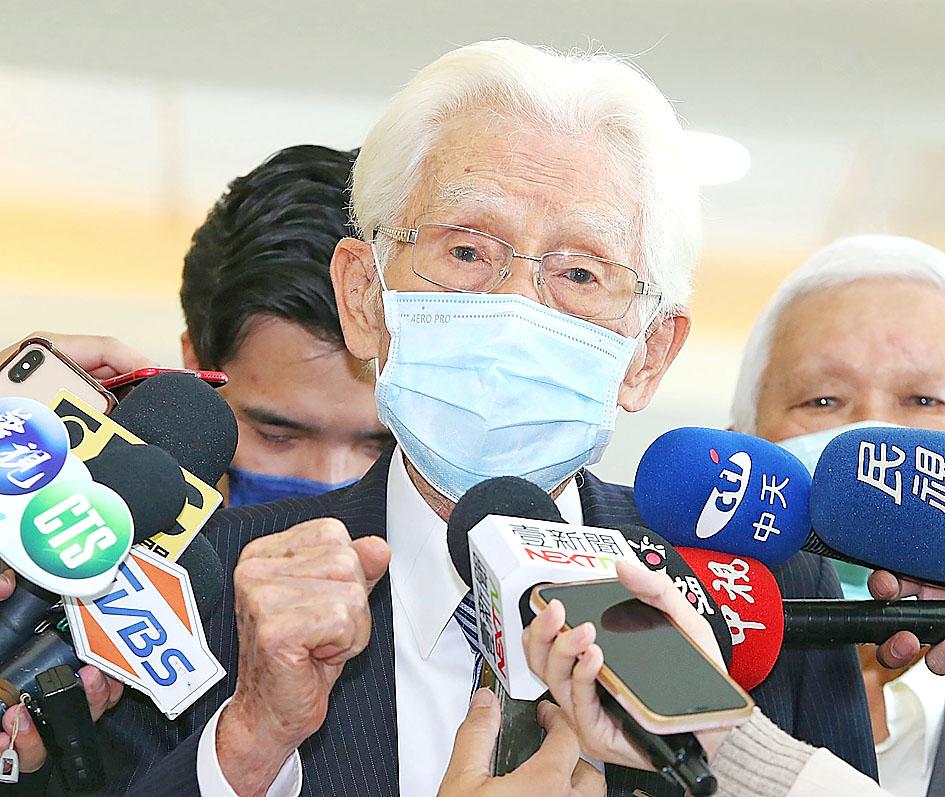Taiwan New Constitution Foundation founder Koo Kwang-ming (辜寬敏) yesterday said he would quit as Presidential Officer adviser over the Democratic Progressive Party (DPP) government’s lack of progress in normalizing Taiwan as a state.
Speaking at a symposium on drafting a new constitution and normalizing Taiwan’s international relations, Koo said President Tsai Ing-wen (蔡英文) has failed to make progress on the issues, despite being in office for several years.
“The government does not want to move on this. It only wants to amend the Constitution — not draft a new constitution,” he said, adding that the difference of opinion between himself and the Tsai administration meant he was left with no option but to resign.

Photo: CNA
Drafting a new constitution is the basis for normalizing Taiwan’s relations, and is supported by a majority of the public, he said.
“The public voted for you, but you remain aloof. Is it your intention to fool the public?” he said, addressing Tsai.
The nation’s future is not decided by the president, and the president must respect the wishes of the public, he said.
Koo said he is not opposed to amending the Constitution to lower the voting age to 18, but added that “making Taiwan a normal country” is a more important task.
“The greatest obstacle to the nation’s normalization is the Republic of China [ROC] Constitution,” he added.
“[Democracy pioneer] Deng Nan-jung (鄭南榕) sacrificed himself for Taiwanese independence, and today as many as 90 percent of the public support normalizing the nation,” he said. “This means making a new constitution. The Republic of China Constitution is foreign.”
When Taiwan sends aid to other countries it does so using China Airlines planes, which means that it is doing so in China’s name, he said.
“Why does the government not dare to even talk about drafting a new constitution? Is it afraid of upsetting Beijing? It should be more focused on helping Taiwan gain prosperity and stability,” he said.
Koo said that he once told former Japanese prime minister Shinzo Abe that if Taiwan ever became part of China, Japan would become a second-tier country.
Abe shook his hand and replied that he “100 percent agreed” with him, Koo said.

Taiwan has received more than US$70 million in royalties as of the end of last year from developing the F-16V jet as countries worldwide purchase or upgrade to this popular model, government and military officials said on Saturday. Taiwan funded the development of the F-16V jet and ended up the sole investor as other countries withdrew from the program. Now the F-16V is increasingly popular and countries must pay Taiwan a percentage in royalties when they purchase new F-16V aircraft or upgrade older F-16 models. The next five years are expected to be the peak for these royalties, with Taiwan potentially earning

POSITIVE DEVELOPMENT: Japan and the US are expected to hold in-depth discussions on Taiwan-related issues during the meeting next month, Japanese sources said The holding of a Japan-US leaders’ meeting ahead of US President Donald Trump’s visit to China is positive news for Taiwan, former Japan-Taiwan Exchange Association representative Hiroyasu Izumi said yesterday. After the Liberal Democratic Party’s landslide victory in Japan’s House of Representatives election, Japanese Prime Minister Sanae Takaichi is scheduled to visit the US next month, where she is to meet with Trump ahead of the US president’s planned visit to China from March 31 to April 2 for a meeting with Chinese President Xi Jinping (習近平). Japan and the US are expected to hold in-depth discussions on Taiwan-related issues during the

‘LIKE-MINDED PARTNER’: Tako van Popta said it would be inappropriate to delay signing the deal with Taiwan because of China, adding he would promote the issue Canadian senators have stressed Taiwan’s importance for international trade and expressed enthusiasm for ensuring the Taiwan-Canada trade cooperation framework agreement is implemented this year. Representative to Canada Harry Tseng (曾厚仁) in an interview with the Central News Agency (CNA) said he was increasingly uneasy about Ottawa’s delays in signing the agreement, especially as Ottawa has warmed toward Beijing. There are “no negotiations left. Not only [is it] initialed, we have three versions of the text ready: English, French and Mandarin,” Tseng said. “That tells you how close we are to the final signature.” Tseng said that he hoped Canadian Prime Minister Mark Carney

STAY IN YOUR LANE: As the US and Israel attack Iran, the ministry has warned China not to overstep by including Taiwanese citizens in its evacuation orders The Ministry of Foreign Affairs (MOFA) yesterday rebuked a statement by China’s embassy in Israel that it would evacuate Taiwanese holders of Chinese travel documents from Israel amid the latter’s escalating conflict with Iran. Tensions have risen across the Middle East in the wake of US and Israeli airstrikes on Iran beginning Saturday. China subsequently issued an evacuation notice for its citizens. In a news release, the Chinese embassy in Israel said holders of “Taiwan compatriot permits (台胞證)” issued to Taiwanese nationals by Chinese authorities for travel to China — could register for evacuation to Egypt. In Taipei, the ministry yesterday said Taiwan